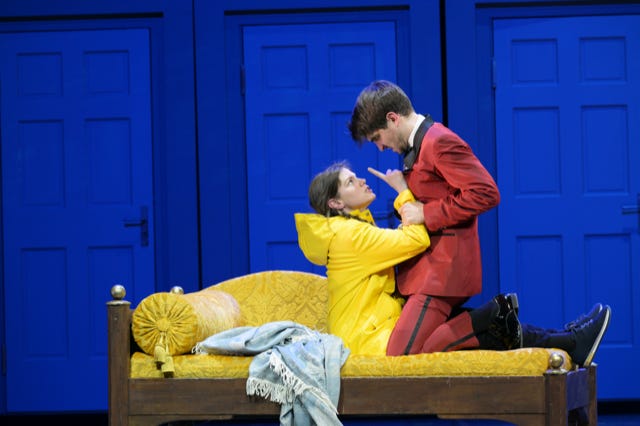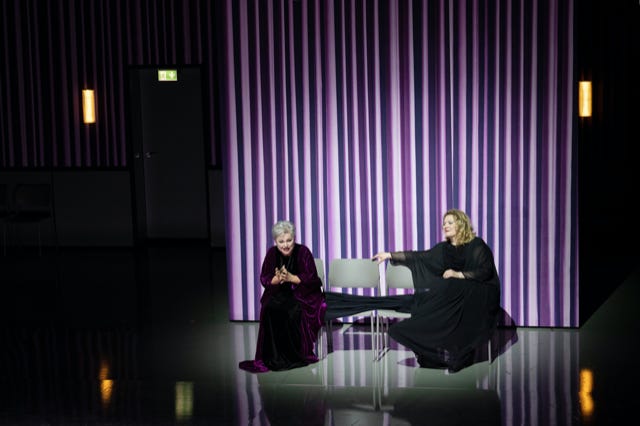Boris Kudlicka’s cyclorama set: centre Domen Križay as the Tsar picture by Barbara Aumüller
This article was first printed in the July edition of Opera magazine and is re-published by permission of the Editor.
Where else, outside festival seasons, could you see three new productions on consecutive nights, let alone of such interesting repertory as at Oper Frankfurt at the beginning of May? On May 4 I saw a double bill of early-20th-century one-acters, rarely staged - Kurt Weill’s Der Zar lässt sich photographieren (‘The Tsar has his photograph taken’) and Carl Orff’s Die Kluge (‘The Clever Woman’). This was followed by Elektra, returning to the theatre’s repertoire in a new staging by Claus Guth, and then Handel’s Hercules, in an uncharacteristically austere but poleaxeing scenic realization by Barrie Kosky.
Keith Warner’s staging of the double-bill was my first experience of the Weill and Orff operas in the theatre. The British director has done much of his finest work in Frankfurt - Reimann’s Lear, Adès’s The Tempest, Pizzetti’s Murder in the Cathedral – and this production, designed by his regular collaborators, Boris Kudlička (sets), Kaspar Glarner (costumes) and John Bishop (lighting), was no exception. A simple cyclorama with additional mobile pieces of scenery on the revolve - discreetly used - made for a seamless evening in which a huge old-fashioned camera shutter served as a framing device. Neither work is a masterpiece. Yet here, in Warner’s deft direction, neither outstayed its welcome.
Weill’s collaboration with the dramatist Georg Kaiser is a fast-moving, 40-minute opera buffa in which an unnamed Tsar visits a photographic studio to have his portrait taken, only to find it has been taken over by revolutionary terrorists, impersonating the photographer, her assistant and their errand-boy. Warner specifies the sitter as the ill-fated Nicholas II, who poses for a family portrait with his Tsarina, the Tsarevich and his four daughters, and at the end we see them massacred in the cellar of the Ipatiev house in Yekaterinburg. The farcical lead-up to this violent denouement proved a glamorous showcase for the Frankfurt ensemble with Domen Križay, well cast as the Tsar, Ambur Braid and Juanita Lascarro as Angèle and her impersonator, AJ Glueckert and Andrew Bidlack as the real and false assistants, and stalwarts such as Alfred Reiter, Peter Marsh, Dietrich Volle and Iain MacNeil among the cameo parts.
The Clever Girl (Elisabeth Reiter) answers the riddles of the King (Mikołaj Trabka) Picture by Barbara Aumüller
Five of these also appeared in Die Kluge, with Bidlack, MacNeil and Volle featuring as the three ‘Strolche’ (rascals or vagabonds), performing a function similar to that of Ping, Pang and Pong in Turandot. Die Kluge was premiered in Frankfurt in 1943, 15 years after the premiere of the Weill. Some commentators have detected implicit criticism of the Nazi regime in the composer’s depiction of the authoritarian King (sung here by Mikołaj Trabka) who poses the clever daughter of the peasant three riddles (Turandot again!) which she successfully answers. He marries her, but his attention fades, and the Happy End is contrived only after he gives her a trunk asking her to put the thing she most values into it. She drugs her husband and puts him there. He wakes and they are reconciled. Orff wrote the libretto of this 80-minute Märchenoper himself and its Singspiel format means that the dramatic momentum flags during the passages of spoken dialogue. Some of the orchestral interludes are both exhilarating (in a 1920s cod-Shostakovich manner) and enchantingly simple, even naive in their folkloric lyricism. Elizabeth Reiter sang the title role with disarming innocence, with Glueckert and Sebastian Geyer as the rival Men with Donkey and Mule. It was all brilliantly held together by the conductor Yi-Chen Lin.
Ich habe keine gute Nächte (I have bad dreams) Susan Bullock as Klytämnestra, Aile Asszonyi as Elektra Picture by Monika Rittershaus
Elektra was the penultimate new production of Sebastian Weigle’s tenure here as Generalmusikdirektor. Guth invariably brings something new to the table with his stagings of German classics, but not everything was convincing here. As the action proceeds it emerges that this is a ‘wishful-thinking’ Elektra and that what we see on stage is actually going on in Elektra’s mind. In Katrin Lea Tag’s classy modern interior setting, the other characters appeared to Aile Asszonyi’s attractively youthful, even elegant protagonist (costumes were by Theresa Wilson) as if in a dream. Elektra is bored by her whining sister (Jennifer Holloway) and mildly irritated by her exhibitionist mother (Susan Bullock); her brother (Kiwhan Sim) is a figment of her imagination, seen by her and us with five doppelgängers who emerge from and recede into the shadows during the great Recognition Scene. Neither Asszonyi nor Sim sounded vocally ideal for their roles, she big-voiced but occasionally blowsy and slightly under the highest notes, he grey-toned and lacking incisiveness of diction, but Bullock swept all before her with her memorable Klytemnestra. A former Elektra herself, she is no mezzo, let alone, as Strauss wanted, a contralto - but her musicianship and intelligent stagecraft helped her to dominate even when she wasn’t singing. She ended her crabby encounter with her daughter by falling asleep on a sofa, surrounded by courtiers watching television. The words ‘He! Lichter!’ (‘Bring lights!’) were wantonly cut by Guth and when she was assassinated, it was Elektra rather than Klytämnestra who screamed (an expression of ecstasy rather than terror?). I wasn’t entirely convinced - but you couldn’t otherwise fault Guth’s theatrical know-how. He conceives Aegisth as a wannabe sing-and-dance act, and Peter Marsh gave an exemplary vignette of flamboyance and paranoia. Smaller roles were all well-cast from the Frankfurt ensemble. The score sounded congested but was well played by the Museumsorchester.
Paula Murrihy as Dejanira Picture by Monika Rittershaus
For anyone who saw Kosky’s Saul at Glyndebourne, his Hercules - with the same designer, Katrin Lea Tag - may have come as a slight disappointment. Kosky undoubtedly respects his Handel, but here I thought he took the composer’s mildly ironic take on the relationship between the hero and his wife Dejanira a tad too seriously. It’s true that comedy; but there are moments of lightness when Handel seems to be poking fun at the protagonist’s boastful tales of his own glory. The design was as simple as Saul’s was elaborate, a white box at an angle to the proscenium with a different statue of Hercules in each act.
As always Kosky got fine performances from his ensemble cast. None was a Handel specialist, though Paula Murrihy, a returning ex-member of the ensemble, has fair form as a singer of Baroque music. In Dejanira’s Mad Scene the exigencies of Kosky’s Personenregie cause her to distort Handel’s music for expressive effect but it worked emotionally and theatrically. Anthony Robin Schneider was a Hercules somewhat impatient with his wife’s jealousy, but sang his airs resonantly, while Elena Villalón and Michael Porter made an attractive pair as Iole and Hyllus. Kelsey Lauritano transformed Lychas into an androgynous go-between, and sang stylishly. In the pit, Laurence Cummings took advantage of a Museumsorchester by now well versed in Handelian style, and Frankfurt’s versatile chorus of actor-singers.








Thanks for this great and detailed report from my home opera base. In deed, these pieces couldn't be more different from each other.
It's a taste of Oper Frankfurt's unrivalled variety of programming in a capsule, as it were. I really can't think of anywhere else where you would see such different operas in such interesting productions and with fine members of the Frankfurt ensemble on three consecutive days.